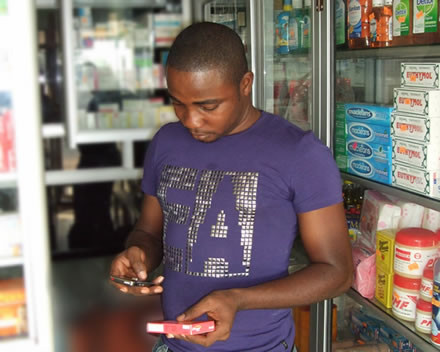In Africa, Mobile Apps Save Lives; Can They Generate Profits?

Africa is not the first thing that comes to mind when mentioning innovations in health care. Yet, thanks to web and mobile apps, it is becoming just that: a place where technology has allowed new solutions to problems that have long plagued the developing world.
One of those problems is the scourge of counterfeit medicines, which end up hurting people and consequently hampering entire economies. A 29-year-old Ghanaian enterpreneur has come up with an Internet-based way to help patients as well as drug companies.
Bright Simons is the founder of mPedigree Networks. The company provides a platform patients throughout Ghana can use to verify, for free, if their medicines are fake, by texting codes marked on the medicine packet to a central database. That’s helping pharmaceutical groups recoup some of the estimated $200 million they lose daily on counterfeit drugs, and reduce the number of life-threatening fakes on sale – 40 percent of the market in some African countries.
“What we are trying to do is make it safer for people to take medicines,” explained Simons, who was named a Young Global Leader by the World Economic Forum in August. “In most parts of Africa, when you take medicines, you are not sure what you are taking.”
MPedigree is also providing drug companies with previously inaccessible market intelligence, including prices and drug sales. “We want to build a world-class, real-time pharmaceutical intelligence group providing governments and pharmaceutical companies with our prescription data,” Simons said.
So everybody wins? Not quite. So far, Simons isn’t making money from it. Despite demand, turning mobile health initiatives into revenue-generating businesses is challenging. MPedigree is a not-for-profit venture; now Simons aims to use the same technology to spin off a new, for-profit business based on the same principle, but dedicated to agricultural chemicals.
MPedigree, now expanding its service into Rwanda and countries outside Africa, including India and the Philippines, is one of hundreds of so-called mobile health, or m-health, initiatives. Mobile phone penetration in Africa has ushered in a raft of new health services, encompassing everything from data collection to mobile telemedicine and awareness campaigns.
“Telecoms groups have transformed the landscape, allowing people in rural areas to connect to new ideas and not be left out of economic growth,” said Simons. According to a report released by the GSM Association, the mobile industry’s worldwide trade body, the global mobile health market will reach $23 billion in revenue by 2017; of that, African providers could generate $1.2 billion.
Translating that revenue – a serious amount of money in Africa, which has several countries with economies smaller than that $1.2 billion figure – into profit remains a challenge.
Nairobi-based Shimba Technologies, a software developer whose MedAfrica mobile app provides a suite of health services such as symptom checkers and doctor and hospital directories, is a case in point. Although the business case for mobile health content in Kenya, a nation with a population of 40 million but just 7,000 doctors, is compelling, founder and CEO Steve Mutinda admits there is a challenge. “Demand for health care is universal; the challenge is keeping content relevant and users engaged,” he said. The app had around 100,000 downloads by June 2012 through app stores Safaricom, Nokia, and Android Market, and the company is preparing to launch a new version next month.
“Revenue comes from premium content subscriptions, advertisements and businesses paying to list with us,” said Mutinda, adding that the anticipated revenue from doctors paying to list on the service was slower than expected. Financing is another challenge: the lack of banks and venture capital means enterpreneurs often have to look for other ways to raise money.
MedAfrica, for example, is backed by Samsung, Nokia and the Kenyan Open Data Initiative, but raising finance to fund the next wave of expansion could be trickier. That’s the reason Shimba Technologies made a pitch to investors at this year’s DEMO conference in Silicon Valley.
Still, in Africa, where the age of communication has arrived late but is taking hold fast, this evolution isn’t driven by profit alone. For Simons, the rewards of success aren’t just financial. He said that ever since he was a student he wanted to try and force change. “I was a student activist and sought to disrupt the system. Now I've put all that anger to good use,” he noted.
© Copyright IBTimes 2024. All rights reserved.





















